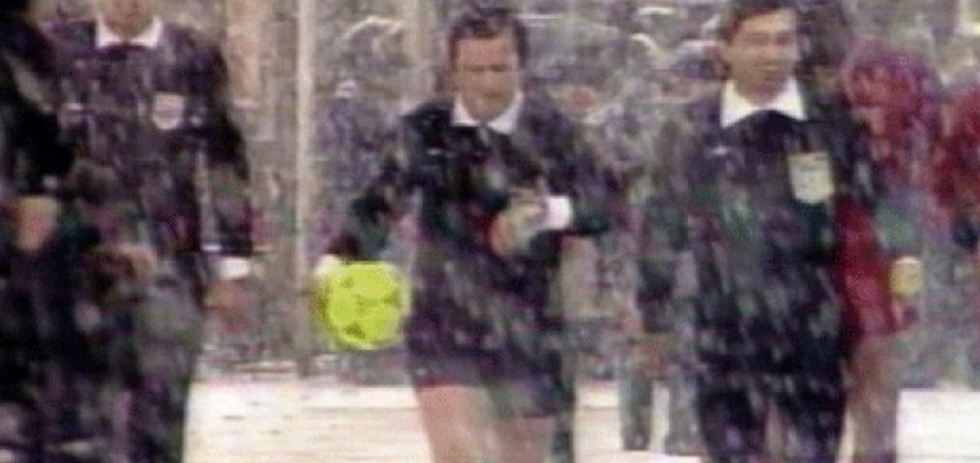
In December 1989, the Romanian people ousted and executed their longtime President Nicolae Ceaușescu and overthrew the country’s communist regime. Under Ceausescu, the nation had become a police state and the ‘Securitate’ (the brutal and pervasive Romanian secret police) had arrested, tortured and killed thousands. A year earlier, Steaua Bucuresti and Dinamo Bucuresti dominated the Romanian football league, Colegiul Divizionar A, as they had for many seasons beforehand. Towards the end of the season, the two clubs met under a near-unplayable snowstorm, in what would prove a decisive match.
The other, more unique aspect of the contest though is that Steaua1 was owned by the army and Dinamo by the secret police. In The Second Game, director Corneliu Porumboiu and his father revisit the match, commentating through the full 90 minutes. Corneliu, the son, has established himself as one of Romanian New Wave’s leading directors, winning the Camera d’Or in 2006 for 12:08 East of Bucharest, while his father, Adrian, was the game’s referee back in 1988.
To be clear, this is a football match and commentary, so don’t go in expecting a traditional documentary or any sort of narrative arc. It’s not even a particularly good football match at that, due to the immense amount of snow that nowadays would probably halt play. What’s most interesting about The Second Game though isn’t the football – it’s everything that surrounds it. Early on, for example, Adrian explains that delegates from both teams attempted to bribe him before the match. Moments later he also nonchalantly notes that in most matches, “at least one of the referees is an informant for the secret police”.
There are only three cameras used in the dusty archival footage of the match, one from bird’s eye, tracking the game; another for close up shots on individual players; and the last, Adrian explains, was pointed at the crowd and used when the players were engaging in “bad sportsmanship” – unacceptable behavior under the Communist regime.
As the game proceeds, the two talk mostly about football and how the games changed over time. Corneliu claims that Adrian played too many advantages, while Adrian insists that he was keeping the game fluid. Adrian redeems an at-times dull commentary. He’s amusingly cynical throughout, questioning the very premise of the commentary and even answering his iPhone and speaking to a friend for a few minutes midway through. The Second Game is like a semi-serious, art-house counterpart to Mystery Science Theatre2, that at times makes fascinating observations about the changing nature of sport, such as when Adrian grumpily suggests, “football is not a subject it’s a perishable product. You have to consume is straight away. Eat it now.”
Unfortunately, the insight wears thin and the latter half of the film proves something of a challenge for those uninterested in the intricacies of refereeing. Adding an extra layer to the commentary, we do see the various sides of the father-son relationship on show, which makes for an interesting dynamic given their respective career paths.
For the most part though, I’d recommend going into this film with at least some background knowledge of the era, because it is an interesting piece of archival cinema placing us just months before the historic Romanian Revolution. While I’m sure most football fans will walk out of The Second Game disappointed and probably quite bored, festivalgoers who like their art docos gritty and unusual will surely be pleased. As a piece of experimental cinema, this is as unique as it gets.
Around the Staff:
| Conor Bateman |
